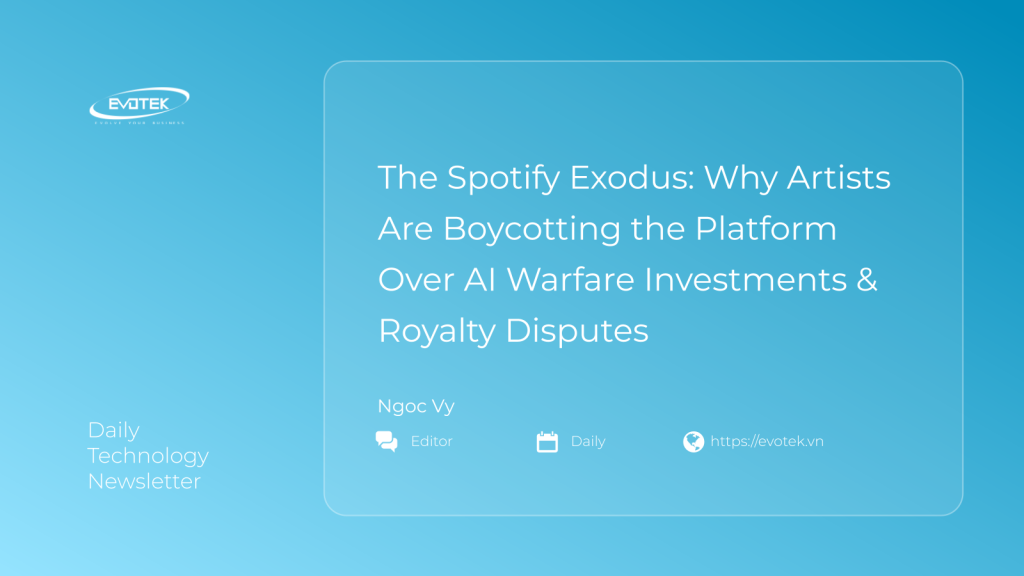A growing number of musicians are withdrawing their catalogs from Spotify, signaling a deepening rift between artists and the streaming giant. While issues of low compensation and the prevalence of AI-generated music have long simmered, the latest wave of departures is primarily fueled by a controversial investment made by Spotify CEO Daniel Ek.
Last week, the acclaimed Canadian post-punk ensemble Godspeed You! Black Emperor joined a significant roster of artists, including American bands Deerhoof and Xiu Xiu, Australian rock group King Gizzard & The Lizard Wizard, Dutch label Kalahari Cult Music, and Australian musician David Bridie, in pulling their music from Spotify and other streaming services. Australian folk singer Leah Senior followed suit on July 1st, while Melbourne synth-punk band Dr Sure’s Unusual Practice announced their upcoming record would deliberately exclude Spotify.
The Core of the Controversy: AI Warfare Investment
Beyond the perennial debates around streaming service monopolies and meager artist pay-per-stream, the current spotlight is firmly on Daniel Ek’s substantial €600 million investment into AI-driven weapons technology. Through his investment fund, Prima Materia, Ek has backed Helsing, a Munich-based defense tech startup specializing in real-time AI warfare and armed interventions via advanced AI software.
This investment arrives amidst a volatile global geopolitical landscape, marked by conflicts like the Russia-Ukraine war and the Israel-Palestine conflict. Ek, who is also the Chairman of Helsing, informed The Financial Times that Helsing’s technology aims to bolster “strategic autonomy” and “security readiness” for Europe. However, for many artists, the ethical implications are profound.
Artists React: “We Don’t Want Our Music Killing People”
The Spotify boycott gained momentum following these revelations. Xiu Xiu, known for their avant-noise sound, starkly labeled Spotify a “garbage hole armageddon portal.” Members of Deerhoof issued a powerful statement: “…We don’t want our music killing people. We don’t want our success being tied to AI battle tech.”
Kalahari Oyster Cult Label echoed these sentiments, declaring they did not want their music “contributing to or benefiting a platform led by someone backing tools of war, surveillance, and violence.” David Bridie articulated the dilemma in The Guardian, observing, “here we are, artists helping to build algorithms to sell our music – and the success of that algorithm determines the flow of wealth to a man who invests in building machines that could kill people.” He further condemned Ek’s investment, stating, “Spotify used to seem like a necessary evil. By association, it now just seems evil.”
Bridie also highlighted the long-standing grievance of artists receiving paltry payments of $0.003 to $0.005 per stream, calling it “insulting and completely unsustainable.” Godspeed You! Black Emperor, in their 2024 album ‘No Title As of 13 February 2024, 28,340 Dead,’ had already brought attention to the human cost of war in Gaza, underscoring their commitment to these ethical stands.
Past Protests and Spotify’s Responses
This isn’t the first time artists have challenged Spotify. In 2022, rock legend Neil Young removed his music over podcaster Joe Rogan’s COVID-19 misinformation, sparking a movement that included Joni Mitchell and Nils Lofgren. Both Young and Mitchell returned in 2024 after Rogan’s podcast expanded to other platforms, highlighting the market dominance of streaming services.
Earlier, in 2014, Radiohead’s Thom Yorke and pop icon Taylor Swift also pulled their music, citing inadequate artist compensation and streaming royalties. Swift eventually returned in 2017 amid reports of increased industry payments.
Spotify has attempted to address some concerns. In 2017, it upgraded its royalty system, and in 2021, launched the ‘Loud and Clear’ initiative for greater transparency, clarifying that it pays labels, publishers, and aggregators, not directly to artists – a key demand. More recently, the platform implemented new rules to combat system abuse, including a 1,000 minimum play threshold for royalties and increasing the minimum track length to two minutes for eligibility, targeting short “noise” tracks. Spotify has also claimed to be working on detecting AI-generated music.
However, the company has remained silent on the recent controversy surrounding Ek’s investment in AI warfare. The widening chasm between artistic integrity and the strategic decisions of one of the world’s largest streaming platforms continues to fuel intense debate. Ek, for his part, remains unfazed: “I’m sure people will criticise it and that’s okay. Personally, I’m not concerned about it. I focus more on doing what I think is right and I am 100 per cent convinced that this is the right thing for Europe.”

 日本語
日本語 한국어
한국어 Tiếng Việt
Tiếng Việt 简体中文
简体中文